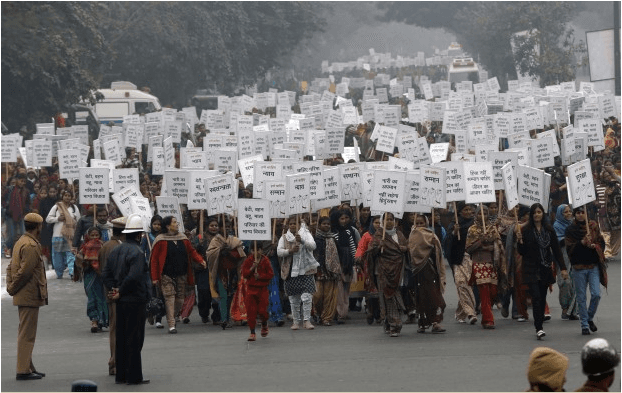Brutal gang rape in Delhi sparks anger, but will it spark change?
Women hold placards as they march during a rally protesting for justice and security for women (Photo: Reuters)
Charges have been filed against five men in the case of a horrific rape and murder of a young woman in Delhi, India. The case has awakened a national conversation about women's rights and roles in Indian society, but it remains to be seen if protests and outrage will turn into lasting change.
Jatin Anand, crime reporter for The Hindustan Times in New Delhi, told PRI's The World that waves of protesters are seeking "a substantial change in the laws that govern the punishment of those who abuse the rights of children and women in this country.”
Ananya Vajpeyi, an associate fellow with the Centre for the Study of Developing Societies in New Delhi, attended protests on New Year's eve, after the victim passed away.
"Now the question that everybody is asking is, how should we consolidate and how should we make something of the momentum that has gathered over the last two weeks?" Vajpeyi said.
The problem, though, is "humungous," beginning with sex-selective abortion in India, which has created a gender imbalance with fewer women than men.
”The violence against women begins with the fetus itself," Vajpeyi said, "and it continues all the way down the line.”
On Dec. 16, a 23-year-old woman, unnamed under Indian law, boarded a public bus with a male friend where she was assaulted and brutally gang raped for nearly an hour while one assailant continued driving. She and her friend were then dumped onto the street, according to police. The victim died from the injuries she sustained two weeks later. Her father told the BBC Hindi Service that she wanted to be a doctor.
This case has triggered a widespread response and "one can only hope that it continues to reverberate to the point where political and legal change sets in," Vajpeyi said.
Journalist Nilanjana Roy, who writes about gender issues from Delhi, described the protests the weekend after the attack. The crowds swelled to 10,000, she said; some protestors called for the death penalty for the rapists, while others wanted an end to sexual violence and the rights of women to move around the city in safety.
The rising anger is in part due to the way women's safety has become a constant concern.
On a daily basis," Roy said, "you're dealing with not just threats of rape but constant harassment.”
Sexual violence against women in India is really not news, nor even surprising for people who have lived in Delhi for any length of time, says Rupa Jha, a journalist with the BBC Hindi Service.
”We all have faced different degrees of sexual harassment on the streets of Delhi," she told PRI's The World days after the attack.
"There is something about the situation in large parts of north India that makes women feel extremely unsafe," Roy said.
She referenced an undercover investigation by the news magazine Tehelka from last spring that exposed Delhi police officers blaming female victims for being raped.
"I don't think the police are acting in isolation. They definitely reflect a wider misogyny, the attitude that a woman is to blame if she's raped, that somehow it's her fault if she goes out, that there's something wrong with what she was wearing, what she was doing, who she was with," Roy said.
While the Delhi police acted quickly in this most recent case, people feel that in most cases reporting a rape can be as traumatic as the rape itself, Roy said. But Jha said that the hype surrounding this case is "just an eyewash.”
"The law may change, but how will you change the cultural attitude of a society of 1.5 billion people? Is any government willing to do that? Are we as a society ready to teach our children how to respect women?" Jha asked.
"I think we've hit a boiling point. I would like to hope that this will start at least an urban women's rights movement," Roy said. "I hope that we don't just drop the issue and move onto something else. Because the fact is that the problem of sexual violence in India isn't going away."
Read more from PRI’s The World’s coverage of the protests, including conversations about women’s lives and safety in India and around the world.
